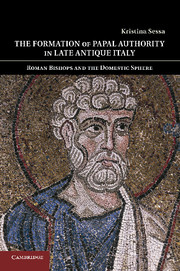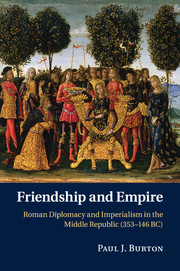Refine search
Actions for selected content:
23990 results in Ancient history
Contents
-
- Book:
- New Studies on the Seleucids
- Published by:
- Jagiellonian University Press
- Published online:
- 05 September 2014
- Print publication:
- 31 December 2011, pp 5-6
-
- Chapter
- Export citation
Frontmatter
-
- Book:
- New Studies on the Seleucids
- Published by:
- Jagiellonian University Press
- Published online:
- 05 September 2014
- Print publication:
- 31 December 2011, pp 1-4
-
- Chapter
- Export citation
Fondazioni di Antioco I Soter in Caria (St. Byz. s.v. Antiocheia)
-
-
- Book:
- New Studies on the Seleucids
- Published by:
- Jagiellonian University Press
- Published online:
- 05 September 2014
- Print publication:
- 31 December 2011, pp 67-80
-
- Chapter
- Export citation

The Formation of Papal Authority in Late Antique Italy
- Roman Bishops and the Domestic Sphere
-
- Published online:
- 05 December 2011
- Print publication:
- 21 November 2011

Friendship and Empire
- Roman Diplomacy and Imperialism in the Middle Republic (353–146 BC)
-
- Published online:
- 05 December 2011
- Print publication:
- 10 November 2011
Chapter 7 - The Household and The Bishop: Authority, Cooperation, and Competition in the Gesta Martyrum
-
- Book:
- The Formation of Papal Authority in Late Antique Italy
- Published online:
- 05 December 2011
- Print publication:
- 21 November 2011, pp 247-273
-
- Chapter
- Export citation
Conclusion
-
- Book:
- The Formation of Papal Authority in Late Antique Italy
- Published online:
- 05 December 2011
- Print publication:
- 21 November 2011, pp 274-282
-
- Chapter
- Export citation
Chapter 4 - Overseeing the Overseer: Bishops and Lay Households
-
- Book:
- The Formation of Papal Authority in Late Antique Italy
- Published online:
- 05 December 2011
- Print publication:
- 21 November 2011, pp 127-173
-
- Chapter
- Export citation
Acknowledgments
-
- Book:
- The Formation of Papal Authority in Late Antique Italy
- Published online:
- 05 December 2011
- Print publication:
- 21 November 2011, pp ix-x
-
- Chapter
- Export citation
Chapter 5 - Cultivating the Clerical Household: Marriage, Property, and Inheritance
-
- Book:
- The Formation of Papal Authority in Late Antique Italy
- Published online:
- 05 December 2011
- Print publication:
- 21 November 2011, pp 174-207
-
- Chapter
- Export citation
Roman Bishops from Peter to Gregory I
-
- Book:
- The Formation of Papal Authority in Late Antique Italy
- Published online:
- 05 December 2011
- Print publication:
- 21 November 2011, pp xv-xvi
-
- Chapter
- Export citation
Introduction: Household Management and the Bishop of Rome
-
- Book:
- The Formation of Papal Authority in Late Antique Italy
- Published online:
- 05 December 2011
- Print publication:
- 21 November 2011, pp 1-34
-
- Chapter
- Export citation
Chapter 3 - Primus Cultor: Episcopal Householding in Theory and Practice
-
- Book:
- The Formation of Papal Authority in Late Antique Italy
- Published online:
- 05 December 2011
- Print publication:
- 21 November 2011, pp 87-126
-
- Chapter
- Export citation
Bibliography
-
- Book:
- The Formation of Papal Authority in Late Antique Italy
- Published online:
- 05 December 2011
- Print publication:
- 21 November 2011, pp 283-312
-
- Chapter
- Export citation
Chapter 1 - The Late Roman Household in Italy
-
- Book:
- The Formation of Papal Authority in Late Antique Italy
- Published online:
- 05 December 2011
- Print publication:
- 21 November 2011, pp 35-62
-
- Chapter
- Export citation
Index
-
- Book:
- The Formation of Papal Authority in Late Antique Italy
- Published online:
- 05 December 2011
- Print publication:
- 21 November 2011, pp 313-323
-
- Chapter
- Export citation
Chapter 2 - From Dominion to Dispensatio: Stewardship as an Elite Ideal
-
- Book:
- The Formation of Papal Authority in Late Antique Italy
- Published online:
- 05 December 2011
- Print publication:
- 21 November 2011, pp 63-86
-
- Chapter
- Export citation
Frontmatter
-
- Book:
- The Formation of Papal Authority in Late Antique Italy
- Published online:
- 05 December 2011
- Print publication:
- 21 November 2011, pp i-v
-
- Chapter
- Export citation
Map - Late Roman Italy
-
- Book:
- The Formation of Papal Authority in Late Antique Italy
- Published online:
- 05 December 2011
- Print publication:
- 21 November 2011, pp xiii-xiv
-
- Chapter
- Export citation
Abbreviations
-
- Book:
- The Formation of Papal Authority in Late Antique Italy
- Published online:
- 05 December 2011
- Print publication:
- 21 November 2011, pp xi-xii
-
- Chapter
- Export citation
